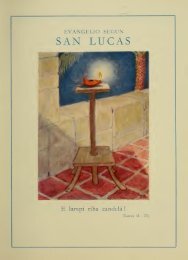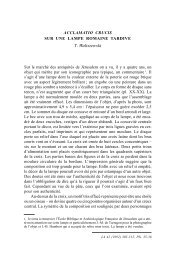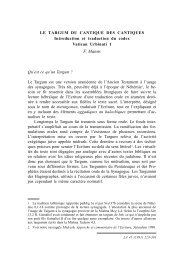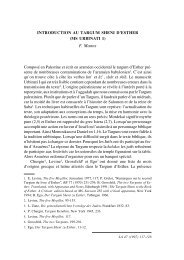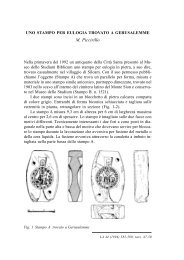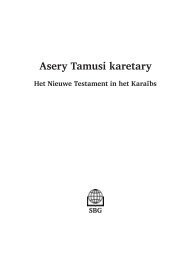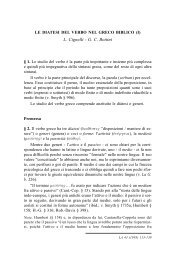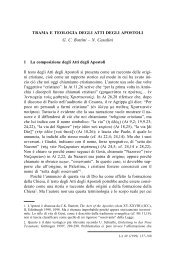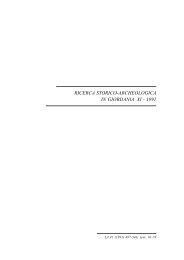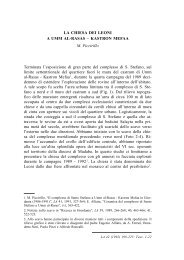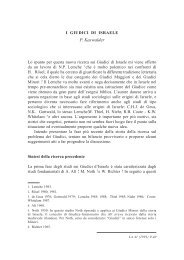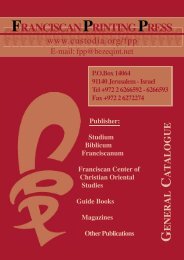Literary Criticism and Theology of P - Christus Rex
Literary Criticism and Theology of P - Christus Rex
Literary Criticism and Theology of P - Christus Rex
You also want an ePaper? Increase the reach of your titles
YUMPU automatically turns print PDFs into web optimized ePapers that Google loves.
24<br />
E. CORTESE<br />
latter has been used by the gospel while registering the NT antagonism<br />
against the temple, whereas the former is used when it describes Jesus’ act <strong>of</strong><br />
purification <strong>of</strong> the temple (Mk 11,15ff.). We can conclude that the destruction<br />
<strong>of</strong> all temple area by the Romans has been a provisional punishment, but that<br />
the temple, <strong>and</strong> not necessarily the OT structure <strong>and</strong> cult, has to remain in<br />
some way as the center <strong>of</strong> the divine worship in God’s plan. This does not<br />
mean that the structures <strong>and</strong> the related OT cult have to be completely rebuilt,<br />
according to the NT. But the expected new cult in that area includes the<br />
Jewish cult also, together with that <strong>of</strong> the other affiliated religions. And this<br />
is precisely what now they carry out, even without being aware <strong>of</strong> it! Our<br />
interpretation defends the area as a central place also for the Jews <strong>of</strong> today,<br />
<strong>and</strong> gives an important theological value to their life here, together with<br />
Christians <strong>and</strong> Muslims. Then the message <strong>of</strong> the divine presence here in the<br />
temple area, at least as a pledge <strong>and</strong> as a promise for the future, should not be<br />
eliminated in the Christian Exegesis.<br />
5b. Strange “spiritualization” by the Jews. Nonetheless Jews have another<br />
way <strong>of</strong> considering the presence <strong>of</strong> God <strong>and</strong> they are probably not inclined to<br />
my perspective. Having lost the temple for 2000 years, the Rabbis looked for<br />
another presence <strong>of</strong> God. We may formulate the result <strong>of</strong> their effort by the<br />
word shekinâ. We can say that, after some cautious thoughts in the first<br />
centuries, by giving more serious consideration to the concreteness <strong>and</strong><br />
singularity <strong>of</strong> the presence <strong>of</strong> God in the tent <strong>and</strong> the temple, Judaism went<br />
easily on the way <strong>of</strong> their philosophers (especially Maimonides) pursuing a<br />
kind <strong>of</strong> a spiritualization, which is similar to the Christian (especially<br />
Protestant) one considered above. So, instead <strong>of</strong> thinking at the temple, they<br />
consider their Sinaitic or covenantal relation with God as the source <strong>of</strong> this<br />
peculiar divine presence among the Jewish people.<br />
It is however interesting to recall some <strong>of</strong> the ancient discussions about<br />
the divine presence. In the Dialogue with Trifon (56,60), the Christian partner<br />
asks: “if God, as transcendent, cannot be concretely present, then what did the<br />
Patriarchs see in their encounter with Him, if He was not in any way<br />
incarnated?”. Urbach, by quoting this page points out that there were Jews,<br />
who admitted such peculiar sort <strong>of</strong> divine presence 41 .<br />
Anyhow, many medieval Jews were not content with their philosophical<br />
solutions. In the Kabbala, <strong>and</strong> later on in the Hasidic Doctrine, they think <strong>of</strong> a<br />
real divine presence in the world, which exceeds a mere spiritual presence.<br />
Even today Jews speaking <strong>of</strong> the real presence <strong>of</strong> God in the world, mention<br />
41. E.E. Urbach, The Sages. Their Concepts <strong>and</strong> Beliefs, Jerusalem 1975, 49f.




